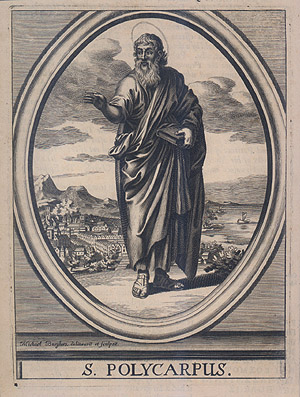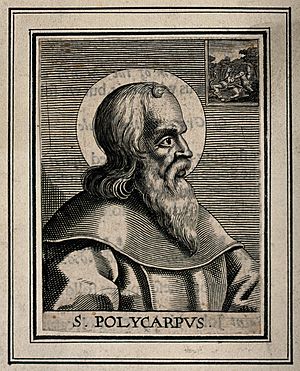Polycarp facts for kids
Quick facts for kids SaintPolycarp |
|
|---|---|
 |
|
| Martyr, Church Father and Bishop of Smyrna |
|
| Born | AD 69 |
| Died | AD 155 (aged 85-86) Smyrna, Asia, Roman Empire (modern-day Izmir, Turkey) |
| Venerated in | Catholic Church, Church of the East, Oriental Orthodox Church, Eastern Orthodox Church Anglican Communion, Lutheran Church |
| Feast | 23 February (formerly 26 January) |
| Attributes | Wearing the pallium, holding a book representing his Epistle to the Philippians |
| Patronage | Earache Sufferers |
| Influences | Clement of Rome, John the Apostle |
| Influenced | Irenaeus |
| Major works | Epistle of Polycarp to the Philippians |
Polycarp (born around AD 69, died around AD 155) was an important early Christian leader. He served as a bishop (a high-ranking church leader) in a city called Smyrna (which is now Izmir, Turkey). People remember Polycarp because he was a martyr, meaning he died for his Christian faith. He is considered a saint and a Church Father, which is a respected early Christian teacher. Many Christian groups, like the Catholic, Eastern Orthodox, and Anglican churches, honor him.
Both Irenaeus and Tertullian, who were early Christian writers, said that Polycarp was a student of John the Apostle. John was one of Jesus's main disciples. Another writer, Jerome, also wrote that John the Apostle made Polycarp the bishop of Smyrna. Polycarp is seen as one of the three most important "Apostolic Fathers." These were early Christian leaders who had direct connections to Jesus's apostles. The other two are Clement of Rome and Ignatius of Antioch.
Contents
Polycarp's Writings and Story
The only writing we still have from Polycarp is his Epistle of Polycarp to the Philippians. This letter uses many ideas and quotes from the Greek Scriptures (the Old Testament). We also have a story about his death called Martyrdom of Polycarp. These two writings are part of a collection known as the Apostolic Fathers.
The Martyrdom of Polycarp is one of the very first true stories about a Christian dying for their faith. It came after the Acts of the Apostles, which tells about the death of Stephen.
Polycarp's Life
We learn about Polycarp's life from several old writings. The main ones are The Martyrdom of Polycarp, a book by Irenaeus called Adversus Haereses, and letters from Ignatius of Antioch. Polycarp's own letter to the Philippians also gives us clues.
Connected to the Apostles
Irenaeus said that Polycarp was a friend of Papias, who also heard stories from John. Polycarp also wrote to and received letters from Ignatius of Antioch. Polycarp's letter to the Philippians shows us how early Christians used parts of the New Testament.
Irenaeus believed that Polycarp's memories were a direct link to the time of the apostles. He said Polycarp talked with John and others who had actually seen Jesus. Irenaeus wrote that Polycarp became a Christian because of the apostles. He also said that Polycarp was made a church leader and spoke with many people who had seen Jesus. Irenaeus felt lucky to have known Polycarp when he was young, as Polycarp was very old then.
Meeting with Pope Anicetus
Irenaeus also wrote that Polycarp visited Rome when Anicetus was the Bishop of Rome. They met to talk about differences in how churches in Asia (where Polycarp lived) and Rome did things. Irenaeus said they quickly agreed on some matters.
However, they had different ways of celebrating Easter. Polycarp followed the Eastern custom of celebrating it on the 14th day of Nisan. This was the same day as the Jewish Passover, no matter what day of the week it was. Anicetus followed the Western custom, celebrating Easter on the first Sunday after the first full moon after the spring equinox. Even with this difference, they remained in full communion (meaning they were still united as Christians). Anicetus even let Polycarp lead the Eucharist (a special church service) in his own church, which was a great honor.
Polycarp's Martyrdom
The story of Polycarp's death, called the Martyrdom, says that on the day he died, he said: "Eighty and six years I have served Him, and He has done me no wrong." This might mean he was 86 years old, or that he had been a Christian for 86 years.
Polycarp also said: "How then can I speak badly about my King and Savior? You threaten me with a fire that burns for a short time and then goes out. But you do not know about the fire of everlasting punishment that is ready for the wicked." Polycarp was burned at the stake and then stabbed with a spear because he refused to burn incense (a religious offering) to the Roman emperor. This was seen as worshiping the emperor instead of God. As he was dying, he said: "I bless you, Father, for judging me worthy of this hour, so that with the other martyrs I may share the cup of Christ."
The exact date of Polycarp's death is debated by historians. Some believe it was around 166–167 AD, while others suggest it was earlier, around 155 or 156 AD. The earlier dates fit better with the idea that he knew Ignatius and John the Evangelist.
Why Polycarp is Important
Polycarp holds a very important place in the history of the early Christian Church. People at the time called him "the most wonderful Polycarp," and said he was an "apostolic and prophetic teacher and bishop." He is one of the earliest Christians whose writings we still have today. Jerome wrote that Polycarp was a "student of the apostle John and was made a church leader in Smyrna by him."
Polycarp was a leader of an important church community that helped build the Christian Church. He lived during a time when the true teachings of Christianity were being established. His beliefs are widely accepted by many Christian groups today.
Irenaeus, who heard Polycarp preach when he was young, described him as "a man who was much more important, and a stronger witness of truth, than Valentinus and Marcion and the other heretics" (people who taught different, incorrect ideas about Christianity). Polycarp lived after the apostles had died, when many different ideas about Jesus were being taught. His role was to confirm the correct Christian teachings because of his direct connection to John the Apostle. Irenaeus said that when Polycarp visited Rome, his teachings helped many followers of Marcion and Valentinus change their minds.
Polycarp is remembered in the Church of England with a special day on 23 February. In a church in Rome, Italy, there are special items believed to be relics (remains) of Polycarp.
Polycarp's Beliefs
Polycarp believed that Jesus is the "son of God" and the "eternal high priest." He taught that "all heavenly and earthly things were under his power, whom every breath worships, who comes as a judge of the living and the dead." Polycarp also stressed that Jesus was without sin. He defended the idea that Jesus was both God and human (Incarnation) and that he died on the cross. He strongly disagreed with the teachings of Marcion, calling him "the firstborn of Satan." Polycarp's statements in the Martyrdom of Polycarp also seem to show a belief in the Trinity (God as Father, Son, and Holy Spirit).
What we know about Polycarp's beliefs about the end times is mostly that he believed in the resurrection of the dead and Christ's second coming as a judge.
Polycarp referred to many books that are now in the New Testament as scripture. These include Matthew, Acts, 1 John, Philippians, Jude, 1 Peter, 1 Timothy, 2 Timothy, and Romans.
Polycarp's letter to the Philippians only mentions "presbyters" (elders) and "deacons" (church helpers). This might mean that the church in Philippi was led by a group of elders, which could be different from the church structure seen in Ignatius's letters.
Polycarp was a Quartodeciman. This means he celebrated Easter on the 14th of Nisan, like the Jewish Passover. According to Eusebius, Polycarp said he celebrated Easter this way with John the Apostle. Polycarp seemed to think that teaching wrong ideas about Christianity was even more serious than acting immorally. He called immoral people to change their ways, but he called false teachers "firstborn of Satan."
Polycarp famously said, "I have served him eighty-six years and in no way has he dealt unjustly with me." Some people believe this means he was baptized as an infant and served Christ his whole life. However, others say the quote is unclear about baptism and could simply mean he had always served Jesus and would not stop, even at 86 years old.
See also
 In Spanish: Policarpo de Esmirna para niños
In Spanish: Policarpo de Esmirna para niños
- Christianity in the 1st century
- Christianity in the 2nd century
- History of early Christianity
- List of Christian martyrs
- Saint Polycarp, patron saint archive


